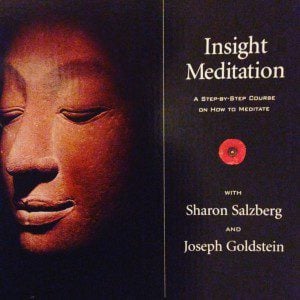 This month I am returning to a classic in Western Buddhism: Insight Meditation, with Sharon Salzberg and Joseph Goldstein. I’ll promise to share more gems from the text as I pass by them, but this one stood out for its resonance with my recent Valentine’s Day post, as well as an older one featuring Portlandia’s episode “Meditation Crush” (see below).
This month I am returning to a classic in Western Buddhism: Insight Meditation, with Sharon Salzberg and Joseph Goldstein. I’ll promise to share more gems from the text as I pass by them, but this one stood out for its resonance with my recent Valentine’s Day post, as well as an older one featuring Portlandia’s episode “Meditation Crush” (see below).
In a section subtitled DESIRE, Joseph Goldstein recounts:
A very common phenomenon, especially on retreats, is the vipassana romance. We may have anywhere from 50 to 150 people practicing in silence; not speaking to one another; supposedly not looking around. Yet it doesn’t take long before somehow, you’ve managed to scope out the entire room and find that one person to whom you feel this amazing attraction.You may never have spoken to them; you may know nothing about them. And yet the mind starts building this fantasy of meeting them; getting together after the retreat; going off someplace together; getting married; having kids … a whole fantasy arises through the power of desire in the mind. These internal dramas can be very enjoyable.
You might recall a 2012 post here featuring Portlandia that perfectly illustrated this:
(if this doesn’t work, click here: http://www.hulu.com/watch/442586)
However, in the next section, called DESIRE VERSUS REALITY, Goldstein warns:
It makes no difference whether the thing we’re craving is an external object or an internal state. The force of desire or addiction in the mind to a particular outcome hinders concentration and obscures our natural wisdom. We become entranced and seduced by the object of our wanting. It’s as if we’re living in a world of enchantment, and then we get lost in the force of that wanting.
He recounts an advertisement for a cruise to Asia, sprinkled with Buddhist language and promising nirvana. As he writes, “This is the message we often get: ‘Fulfill this desire, buy this product, have this experience, and you will achieve everlasting happiness.’ The gift of meditation is that it helps us see through this illusion.”
And seeing through illusions, whether they are for the products being pushed at you by the media or those we all inevitably create around romantic life, is liberating. And when our fantasy-bubbles are burst and we confront reality we get an opportunity: react with scorn, or open up to the experience with the gift of acceptance.
*note, Buddhists do still take cruises and engage in romantic fantasy. With a little practice, however, their expectations for finding nirvana in either is radically diminished.












